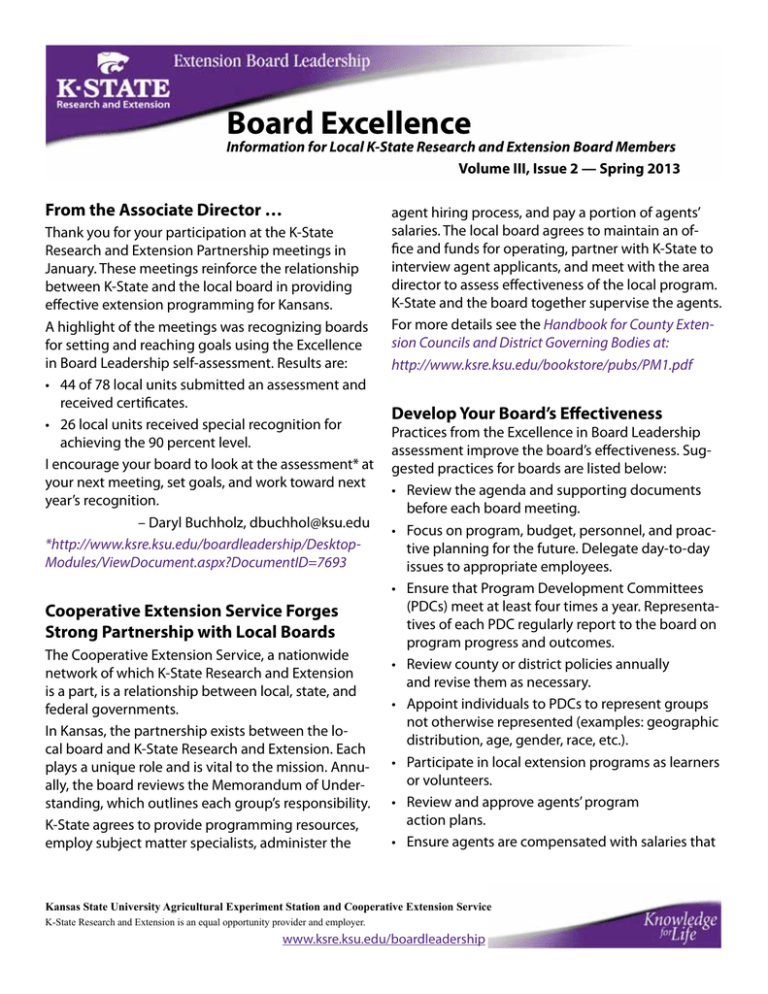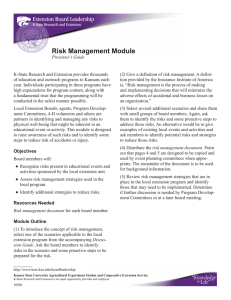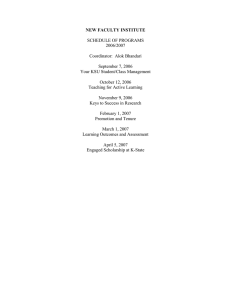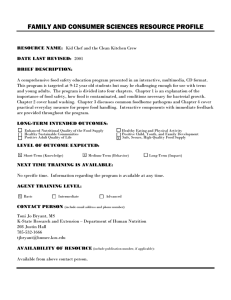Board Excellence From the Associate Director …
advertisement

Board Excellence Information for Local K-State Research and Extension Board Members Volume III, Issue 2 — Spring 2013 From the Associate Director … Thank you for your participation at the K-State Research and Extension Partnership meetings in January. These meetings reinforce the relationship between K-State and the local board in providing effective extension programming for Kansans. A highlight of the meetings was recognizing boards for setting and reaching goals using the Excellence in Board Leadership self-assessment. Results are: • 44 of 78 local units submitted an assessment and received certificates. • 26 local units received special recognition for achieving the 90 percent level. I encourage your board to look at the assessment* at your next meeting, set goals, and work toward next year’s recognition. – Daryl Buchholz, dbuchhol@ksu.edu *http://www.ksre.ksu.edu/boardleadership/DesktopModules/ViewDocument.aspx?DocumentID=7693 Cooperative Extension Service Forges Strong Partnership with Local Boards The Cooperative Extension Service, a nationwide network of which K-State Research and Extension is a part, is a relationship between local, state, and federal governments. In Kansas, the partnership exists between the local board and K-State Research and Extension. Each plays a unique role and is vital to the mission. Annually, the board reviews the Memorandum of Understanding, which outlines each group’s responsibility. K-State agrees to provide programming resources, employ subject matter specialists, administer the agent hiring process, and pay a portion of agents’ salaries. The local board agrees to maintain an office and funds for operating, partner with K-State to interview agent applicants, and meet with the area director to assess effectiveness of the local program. K-State and the board together supervise the agents. For more details see the Handbook for County Extension Councils and District Governing Bodies at: http://www.ksre.ksu.edu/bookstore/pubs/PM1.pdf Develop Your Board’s Effectiveness Practices from the Excellence in Board Leadership assessment improve the board’s effectiveness. Suggested practices for boards are listed below: • Review the agenda and supporting documents before each board meeting. • Focus on program, budget, personnel, and proactive planning for the future. Delegate day-to-day issues to appropriate employees. • Ensure that Program Development Committees (PDCs) meet at least four times a year. Representatives of each PDC regularly report to the board on program progress and outcomes. • Review county or district policies annually and revise them as necessary. • Appoint individuals to PDCs to represent groups not otherwise represented (examples: geographic distribution, age, gender, race, etc.). • Participate in local extension programs as learners or volunteers. • Review and approve agents’ program action plans. • Ensure agents are compensated with salaries that Kansas State University Agricultural Experiment Station and Cooperative Extension Service K-State Research and Extension is an equal opportunity provider and employer. www.ksre.ksu.edu/boardleadership • • • • reflect their professional responsibilities, performance, and leadership in the community. Maintain active committees with specific assignments and responsibilities: personnel, nominating, budget, etc. Start and end meetings on time. Understand, value, and support volunteers in expanding and sustaining the educational program. Confirm that each board member completes a performance review for each agent. District Board Member Election at Hand New extension district board members are elected on the first Tuesday in April. The board is encouraged to schedule an orientation for new board members. The New Board Member Orientation can be found on the Board Leadership website at: http://www.ksre.ksu.edu/boardleadership/p. aspx?tabindex=51&tabid=565. The district holds its organizational meeting in July. An outline for the organizational meeting can also be found on the Board Leadership website at: http://www.ksre.ksu.edu/boardleadership/p. aspx?tabid=564. New Extension Advisory Members Elected Six new members of the State Extension Advisory Council were elected at the recent Partnership meetings. They are: Randy Lucas, Seward County; Rhonda Gaede, Twin Creeks District; Tatum Kimzey, Ellis County; Ray Bartholomew, Reno County; Ken Moldenhauer, Sedgwick County; and Jodie Bartelson, Sumner County. SEAC members must be current or past board chairs. They serve four-year terms as an advisory group to the Director of Extension. The council meets in February and August. The February meeting in Topeka includes visits with legislators. The August meeting location rotates around the state and features dif- ferent K-State Research and Extension programs. More information is on the Board Leadership website: http://www.ksre.ksu.edu/boardleadership/p. aspx?tabid=557 Volunteers Contribute Valuable Time, Skill K-State Research and Extension relies on a strong ethic of volunteerism. Volunteers work as board and program development committee members, Master Gardeners, Master Food Volunteers, and 4-H leaders, among others. In K-State Research and Extension: • both youth and adults can be volunteers in educational programming; • volunteers multiply opportunities for program delivery and audience outreach; • volunteers and the programs they serve mutually benefit; and • volunteers and professional staff are valued, with active preparation and training provided. Focus on Outcomes The 4-H Study of Positive Youth Development, conducted by Tufts University, showed that the structured learning, encouragement, and adult mentoring received through participation in 4-H plays a vital role in helping young people achieve life successes. The study showed that 4-H members: • make healthy choices more often, • excel in school and the sciences, and • are committed to improving their communities. The study also showed that girls in 4-H are more than twice as likely as their peers to participate in science, engineering, or computer technology programs. For additional information about the study go to: www.4-H.org/about/youth-development-research. Volume III, Issue 2 – Spring 2013 Click here for a link to the weekly K-State Research and Extension Tuesday Letter.


